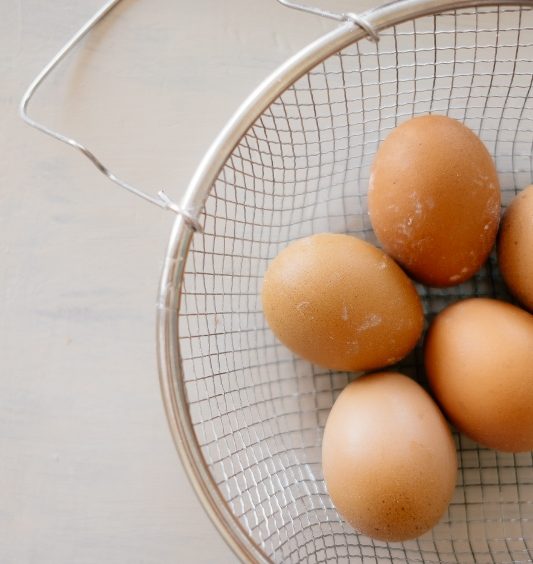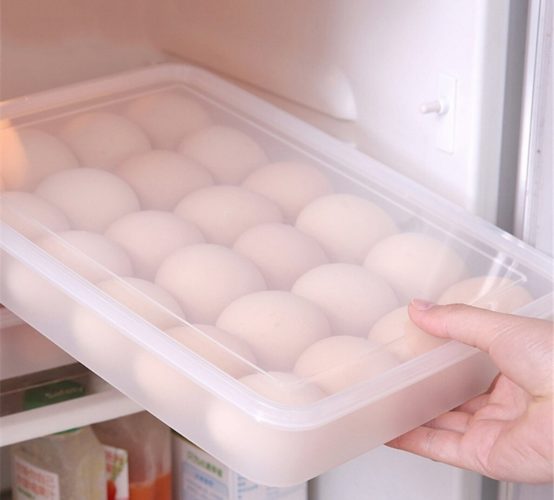Whether you are producing eggs to sell or just for home consumption, the way you care for and store eggs is a key part of ensuring a quality product for consumption.
Collect the eggs as soon as possible after laying. Most hens lay their eggs before 10am in the morning. If you can manage it, collecting eggs twice a day can help keep them really clean, and also discourages egg eating.
Take care to remove any broken eggs. They quickly attract bacteria, insects and rodents. You also want to prevent the hens from eating the contents. When a hen accidentally cracks an egg and she investigates it, she finds that it’s tasty and nutritious and gobbles it down. This behaviour can spread quickly among the flock and, if left uncorrected, can be difficult to stop.
Unwashed eggs have a natural antibacterial coating called bloom, so try to clean your soiled eggs without wetting them. This means using something abrasive to rub off any dirt or droppings until the egg is clean. This method keeps most of the bloom intact. Use a sanding sponge, loofah, soft sandpaper or abrasive sponge of some kind to dry clean your eggs. Be sure to sanitize the sanding sponge, or whatever you’re using to clean the eggs, occasionally.
Do you have to wash eggs?
If your eggs are just too dirty to dry clean you can use water to clean them. Sometimes they get egg yolk on them from a broken egg, which is impossible to remove without washing.
Make sure to use water that is warmer than the egg temperature ~ medium warmth, not hot, but not tepid, either. Cold water actually causes the pores in an eggshell to pull bacteria from the surface in through the shell and into the egg, where you don’t want it.
Do not immerse the eggs in water or let them stand in water ~ rather wash the eggs under running water from the tap. Another method is to spray the eggs in wire baskets with warm water. Let them sit, then wipe them with a dry paper towel one at a time. Place clean eggs into another basket.

Follow this with a sanitizing spray, using bleach diluted in water for the spray mixture. Then allow the eggs to dry on a rack or in a basket.
If you want to sell eggs there are regulations that need to be complied with. These include the sizing and grading of eggs, containers and other packaging and marking requirements. You can access the latest regulation here.
How To Store Eggs Safely
When it comes to storing eggs, the conventional wisdom is to store them in the carton in the fridge. That’s fine if you bought eggs in a carton. But if you have taken them from your own hens, you won’t have a carton. Health experts advise against re-using cartons that you have saved or been given, as there might be bacteria lurking in them.
An interesting experiment was carried out some years ago in the US to establish which is the best method of storing eggs, so that they are still usable months down the line.
Researchers bought 30 dozen guaranteed fresh, washed, uniform-sized supermarket eggs and they also collected another 30 dozen fresh, unwashed, non-uniform, plot-type, fertile, non-supermarket eggs.
They began by dividing their 60 dozen eggs right down the middle, with 30 dozen fertile eggs on one side and 30 dozen unfertile eggs on the other.
Each set of 360 eggs was then further divided into 10 separate batches of three dozen each. The eggs were then stored in various different ways, including in “waterglass”, sand, covered in lard or Vaseline. Their conclusion was that the batch that was kept under “controlled refrigeration”, which were in an airtight container and stored at between 2°C and 4°C showed the best results. After an astonishing seven months these eggs smelt good, tasted good and had a good texture.
Did You Know You Can Freeze Eggs?
You can freeze eggs in different forms, but not in their shells. Whole eggs must be beaten beforehand. You can freeze the whites and the yolks separately too. Hard boiled yolks freeze well, but not boiled whites or whole eggs.
This is part five of a series on egg production. To ensure you don’t missed out on the any part of the series, subscribe here to receive our Feature Newsletter at the end of the series. Read the previous article in this series here.


An Excellent Series !